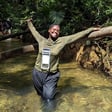Become a Creator today!Start creating today - Share your story with the world!
Start for free
00:00:00
00:00:01

#FindTaylorCasey: When A Loved One Goes Missing Abroad
What do you do when a loved one goes missing abroad? Host Janna Zinzi speaks with guest Emily Williams about the disappearance of Taylor Casey - her best friend - a Black trans woman who went missing during a yoga retreat in The Bahamas. Emily shares her experience navigating an international investigation while grieving, the lack of support from authorities, and the impact of identity on the case. We discuss how anti-Blackness and transphobia play a role in whose lives are valued, and how travelers and our loved ones can protect ourselves and each other. Follow @findtaylorcasey to support and stay involved.
Produced, edited and hosted by Janna A. Zinzi of WanderWomxn Travels.
Transcript
Introduction to Spirit in the Material World
00:00:01
Speaker
Greetings, beautiful people. Welcome to this episode of Spirit in the Material World, your Audible Eat, Pray, Love remix with Old Bay, Shea Butter, and Sandalwood.
00:00:12
Speaker
I'm your host, Jana Zinzi, also known as Jazz, and it is my honor and pleasure to welcome Emily Williams to the show today. She is a highly respected social justice leader with a background in global advocacy and higher education.
00:00:28
Speaker
There's so much more I could say about her brilliance and how fierce um Emily is in the world, but we'll leave it at that. I'll, you know, we'll get there.
Who is Taylor Casey?
00:00:37
Speaker
um And also she is the best friend of Taylor Casey, a beautiful Black trans youth advocate who disappeared in the Bahamas last year.
00:00:47
Speaker
We are going to have a discussion about this case. And what she's learned and what travelers and people who love travelers should know about dealing with a loved one's disappearance abroad.
00:00:58
Speaker
Thank you so much for being here, Emily. Yeah, thank you for having me, Jenna. Of course, of course. This is ah really important conversation um that I've been, you know, we've been wanting to have together and wanting to, you know, bring you on the show to share a bit um about this.
00:01:15
Speaker
ah Taylor's case did get because of, you know, you and and the family's um diligence and and you know persistence, it did get some press attention. But can you share with the listeners more about um what happened with Taylor?
00:01:32
Speaker
Yeah, yeah um yeah. And thanks again for um really amplifying Taylor's story because um Taylor disappeared um in June of last year.
00:01:44
Speaker
um Taylor was at um the Sivananda um ashram yoga retreat center in paradise island Bahamas, ah for a teacher training in June of last year in June of 2024 and, um, was reported missing.
00:02:05
Speaker
They said that they had that Taylor had not shown up for class, um, and ah for an entire day. Um, and then, um, they, um,
00:02:20
Speaker
didn't see her the next morning. um and so then they reported her missing and, um,
00:02:30
Speaker
take your time. Um, Thank you. Of course. Yeah. For us, it was shocking for so many reasons. One, um you know yoga retreats are exactly what single women do ah to travel alone and to travel safely.
00:02:49
Speaker
And Taylor was in that teacher training with 14 other participants. Um, and it's exactly the kind of place where she should have been safe. She was there, had been there for two and a half weeks before she disappeared.
00:03:05
Speaker
Um, so, um, Taylor's mom, myself, um, and a few others, uh, went down to the Bahamas and, um, you know, what we found there was to say disappointing is, is an understatement.
Was the investigation in the Bahamas effective?
00:03:21
Speaker
Um, You know, the in but the investigation was ah seriously lacking. um It was almost as if they weren't even trying to find Taylor. um You know, we arrived and the police didn't have any information.
00:03:38
Speaker
didn't have any missing persons flyers of Taylor up in their, um, like police center. We didn't see any missing flyers, um, at all while we were on the Island anywhere.
00:03:51
Speaker
um including at Sivananda, um, Ashram and there, we didn't see any missing flyer any missing persons flyers while we were there either. In fact, we had gotten reports ah from um people who were going to that ashram to Sivananda after the week or two after Taylor had gone missing and they actually canceled their stay because they learned through the media that Taylor had gone missing and they had not been informed by the ashram itself.
00:04:24
Speaker
So um it was it was pretty horrifying to um show up there and learn that, you know, in fact, um not much had been done by way of investigation.
00:04:36
Speaker
um And, you know, the most, um the the biggest development in the investigation was actually facilitated by Taylor's niece, who was able to ping the location of Taylor's phone and then send the location to the police in the Bahamas.
00:04:54
Speaker
um And so you know, you amplifying Taylor's case when we're almost a year out from her disappearance matters a lot in part because, you know, the investigation led by the Royal Bahamian Police Force was has not turned up any additional information since we were last there um in June of last year.
00:05:21
Speaker
um And so you can imagine, ah ah actually don't imagine. i don't I don't want anyone to have to experience what we've experienced because it's horrifying to have a loved one go missing.
00:05:32
Speaker
And then it is beyond infuriating to know that there is such a lack of will as well as a lack of capacity. Perhaps, I mean, you know, these are things that one can only surmise that it's a lack of will, that it's a lack of capacity to actually find, you know, your person who you love so much.
00:05:52
Speaker
Right. Right.
How did the family cope emotionally?
00:05:54
Speaker
Um, And I feel like that's very like gracious um and compassionate to a mat to think of it it as a lack of capacity. um Because um
00:06:09
Speaker
the level of frustration and, you know, I don't know what, if you can share what those experiences were like navigating conversations with the police. navigating conversations with the ashram.
00:06:20
Speaker
And also, was there any involvement from like U.S. authorities? um Since, you know, this person is, you know, U.S. citizen, I'm assuming. um What was that like? now Like figuring out how to even, where do you even begin and how do you navigate something like this?
00:06:39
Speaker
It's all woefully lacking, all of it, and from every single party who you just mentioned. um and You know, I'll say this in general. um You know, no one knows what this feels like until they've experienced it. You know,
00:06:55
Speaker
i um You know, i consider myself a very empathetic person and I care a lot about what happens to people who I don't know, you know, or who I would never know, you not but bad things happen to them.
00:07:08
Speaker
And, um, to be in this kind of situation personally, um, is unlike anything I could have ever imagined. So I'll say that. Um, and there's, um,
00:07:23
Speaker
you know, it's Taylor is my best friend, you know, for 15 years. And I've described it to a lot of people, especially people who maybe aren't in social justice communities or aren't in queer communities.
00:07:36
Speaker
um But like when you have someone, when you're, you know, you're not in a traditional heterosexual relationship, you're not married, right? You're not following these social conventions.
00:07:47
Speaker
um It's like your best friend is your person. You know, Taylor's my person. Taylor knows about everything that's happened in my life over the last 15 years. You know, the person who knows me, sees me and me, her, you know? And so, um
00:08:05
Speaker
you know, I think about sometimes like some marriages don't last 15 years. Okay. You know, yes so, um, you know, and there's, um, from outsiders, right. Even when people think that they're being supportive, there's like this pressure to like be rational or be logical or, you know, and, um,
What was the police's response?
00:08:34
Speaker
when the situation is anything but, right? You know, we dealing with the police in the Bahamas, um you know, there's like a bit of insistence that we should give them the benefit of the doubt that they're doing everything they can.
00:08:52
Speaker
When you look at a situation rationally, logically, absolutely not. No, you have not. That's, that is an outrageous claim to say that it was an outrageous claim to say that, you know, less than a week after Taylor had gone missing a day after Taylor had gone missing.
00:09:09
Speaker
It's seriously an outrageous claim to say that right now.
00:09:15
Speaker
um, And, you know, to have to sit across a table from people who are insisting that they're doing everything they can to find your loved one when in fact they have not, um, is it's, it's infuriating.
00:09:33
Speaker
Um, and I think for, um you know, I think goodness for like the strength of Taylor's mom, for my strength, for the strength of the other folks who have been working closely with us um because it would otherwise be crazy making. ah And people can see the details of the investigation and where it was lacking.
00:09:58
Speaker
um at the Find Taylor Casey page on Instagram, where there the press releases that we put out documenting our trip and what we found when we arrived there.
00:10:09
Speaker
um And then to go to the Sivananda um ashram and yoga retreat, um where again, it's like, um,
00:10:24
Speaker
You know, you just feel like there's no way that you're, you could be telling us all of the information, you know, Taylor, who we know in love, um, was with you all for two and a half weeks and you all know nothing.
00:10:38
Speaker
Adults don't just disappear and they don't just disappear from a yoga retreat center on an Island that's supposed to be safe. Right. Um, and you know, they're, um,
00:10:53
Speaker
Engagement sense, I think is really telling, you know, um, they, um, you know, have done very little to assist in the investigation, to assist the family.
00:11:05
Speaker
You would think that, um, you know, an establishment, a business, especially like a yoga, um teacher training, you know, that like kind of espouses,
00:11:19
Speaker
Yeah. Yeah. Spiritual retreat transformation. Right. um You would think that they would um express a little bit more care and concern ah for Taylor's whereabouts, ah some regret about her disappearance and even check in with Taylor's loved ones.
00:11:39
Speaker
But that's not been the case. You know, we arrived to like people weren't even not even all. This, I mean, it's infuriating. Not even everyone who was at, who was staying at the ashram at the time of Taylor's disappearance was informed that Taylor had disappeared.
00:11:56
Speaker
So what does that say about how earnestly people were searching for Taylor? People who could have had information could have seen Taylor, right? They weren't even asked. They weren't even
Was the retreat cooperative in the search?
00:12:06
Speaker
notified that something was wrong.
00:12:09
Speaker
And that's telling. um and you know, again, it's it's it's beyond infuriating because it's saying, well, at a minimum, you you did not do everything you could to find Taylor.
00:12:27
Speaker
and what a like And no concern even for the safety of the other people at the retreat. Like if somebody disappears, one, you want information, has anybody seen this person? And two, you know, maybe there's something you know, like to warn other people like, Hey, be careful if you're, you know, on the beach or whatever it is.
00:12:47
Speaker
um And yeah, that makes my blood boil. These types of um places that are supposedly so focused on like spiritual development and whatever, you know, well-being well-being ascension or whatever, you know, these, these words are, and you can't even, you're so focused on your money. And that's an assumption I'm making, but yeah,
00:13:11
Speaker
that's, I'm just reading the, reading the signs, um, that they're so focused on their coin and their reputation, um, that you wouldn't even, you really don't care about the wellness and wellbeing of these people who are probably paying a lot of money to be there, um, and learn things.
00:13:31
Speaker
And so that's, that's really, really awful. Um, It's awful. And, you know, even when we were there, you know, the police um and the and people at the ashram were telling us like that we couldn't disturb the other guests.
00:13:49
Speaker
You know, we were not to talk to the other guests because we didn't want to disturb their vacation, you know? so it's like, okay, we we clearly see what the precedent is here. What's important to you all.
00:14:01
Speaker
And it's it's not finding Taylor. Mm-hmm. How do you think identity played into this in terms of, you know, racial, you know, gender identity?
00:14:14
Speaker
um I'm really curious what the makeup of like that kind of space is. And also, again, general attitudes towards, um you know, LGBTQ folks.
Did identity affect the search efforts?
00:14:26
Speaker
um in a Caribbean context, I mean, we look at here, but, you know, in a Caribbean context, even if you are and American, right, even if you still have that passport privilege, there are certain things that, you know, don't, ah that still play into how you're being perceived and how you're being valued.
00:14:50
Speaker
100%. Well, going to talk about it. and I'm going to talk about the ashram and then I'm going to talk about the police and going talk about the Bahamas. yeah so you know, starting with the ashram, Sivananda, we, um people who were staying at the retreat, who had gone through trainings at the retreat, um reached out to us to say that,
00:15:15
Speaker
Um, they, you know, believe that because Taylor was black and trans that the people, you know, running the ashram were not dealing well with her.
00:15:25
Speaker
Um, some people who, um, were at the retreat the same time that Taylor was there, um, had said that they, you know, did not do a good job of integrating Taylor into the retreat,
00:15:39
Speaker
There's a very disturbing video um from Taylor's time at the ashram. you know, one of the things that they are to do in their training is to um lead chants, like lead the class in chants. And so Taylor was up on stage leading the class in a chant.
00:15:58
Speaker
And then, you know, we see this white woman come onto stage and like, you know, kind of touch Taylor, like put her arms around Taylor and put her head on Taylor's shoulder.
00:16:09
Speaker
And Taylor like recoils away. And so, you know, it's like, that's, you know, a moment when Taylor was focused on leading the champ, you know, invested in the teacher training.
00:16:22
Speaker
And then someone capitalizes on a vulnerability when Taylor's not paying attention to them. Taylor's paying attention to what they're doing. So we have real questions about what was happening at the, uh, at Sivananda Yoga Retreat Center. Right.
00:16:36
Speaker
um while Taylor was there and um even just from seeing that video as a snippet, right? yeah um Because, you know,
00:16:46
Speaker
um they have And of course, they have shared nothing with us, right? They haven't shared the curriculum. They haven't, ah we haven't been able to, the the actual participants who were in the yoga teacher training with Taylor have refused to talk to attorneys, have refused to talk to investigators, private investigators.
00:17:08
Speaker
And so that's a sign, you know? but Why are we not, why is this not an open conversation about what happened to Taylor and what was going on? and think they signed NDAs? I don't know.
00:17:19
Speaker
I do not think that they signed NDAs. I don't think that they signed NDAs. I think there's been other um influences and suggestions that have been not speaking. I'm sorry. You were, um I cut you off, but I was just like, what? because yeah It's appalling.
00:17:38
Speaker
Yeah. it's appalling yeah Wow. I'm sorry. Please continue. um So, I mean, absolutely.
00:17:48
Speaker
ah think that, um you know, Taylor is a beautiful human being by any standard. Yes. And Taylor is, has a very magnetic personality. Taylor is, you know, very, um very charismatic and people are drawn to Taylor.
00:18:09
Speaker
um And so I think that people, were also very aware um that, you know, they could make Taylor vulnerable in ways. I think, you know, just seeing that video of how they were treating Taylor there.
00:18:27
Speaker
um And, you know... um So I, so I think that Taylor being black and trans, um, played a role in her disappearance and her disappearance 100%.
00:18:43
Speaker
I also, um, you know, when we think about the Bahamas, you know, and one can do internet research and find that they are, um, you know,
00:19:00
Speaker
well-known to be homophobic, that there's a lot of transphobia. phobia um And, you know, some of that I think is like very much related to, you know, kind of a very...
00:19:14
Speaker
traditional Christianity. For sure. um And we also all know that when a young white woman goes missing, you you can't get away from it on the news, you know, and every day, you know, and people come out of the woodwork to find this young woman. it's such a tragedy that she's gone missing, you know?
00:19:38
Speaker
And so it's like all these resources pour out to find her to figure out what happened. Right. And, um you know, we didn't get close to that kind of coverage. Like when we think about the Gabby Petito coverage, like we didn't get close to that, but we got significant coverage. And I think we got, you know, more coverage.
00:19:59
Speaker
I know that we got more coverage and more respectful coverage, um, than most trans women get. Yes. And that's because we worked for it. You know, we made sure that it happened.
00:20:11
Speaker
And also we, we did have, and we still do have some really great partners in media who um you know understand the importance of covering these kinds of um tragedies and harmful things when it happens to any human being, right? right um And so because of that, we were able to get significant visibility.
00:20:36
Speaker
um But there's no doubt in my mind that the investigation actually would have happened and and would have happened thoroughly and would have happened with much more involvement of the US government, of the FBI, if Taylor had been a white woman.
How does media coverage differ for Black trans women?
00:20:56
Speaker
Yes. And that Taylor, um, is black and trans. There's no doubt in my mind that that has contributed to the disregard with which her disappearance has been treated by the authorities in the Bahamas, by not every U.S. um, you know, representative, uh, but certainly some of them, um, and certainly by the ashram, I think there's been some calculation,
00:21:25
Speaker
um yeah you know, in Taylor's disappearance that Taylor is a Black trans woman. And, you know, we know that these statistics globally that Black trans women experience the most violence.
00:21:37
Speaker
um And I think there was some calculation in that um that's related to her disappearance. You know, i I do not think that Taylor just wandered off the ashram and turned up missing. No, I mean, that's not even, that doesn't, it's not even logistically possible. Right.
00:21:58
Speaker
Um,
00:22:01
Speaker
So, yeah, I mean, I think Taylor being Black and trans has is has everything to do with her disappearance and the lack of investigation and the lack of um regard for for finding her and for finding out what's happened to her. I'm like sitting with, I'm like, how is this ashram still...
00:22:21
Speaker
ah you know, operational, like I'm so mad. I'm like, hold on, you know, and then it's like, you know, nitty gritty questions of like, well, are they a U.S. business, you know, operating in the Bahamas? Are they, you know, Bahamian business or like, and that's it's ah not irrelevant, but it's kind of, you know, but besides the point, but because I'm sitting here like,
00:22:46
Speaker
You know what I mean? Like, what are these levers that we pull to, you know, put pressure on them or not even put pressure on them? The rowdy person in me, the activist is like, take them down. You know what I mean? And again, i don't know them, but just that to me to have that level of secrecy is so shady and to not want to, you know,
00:23:12
Speaker
support or help in an investigation in any way is is so sus. But also too, I'm wondering, you were how did you deal with US authorities? Like you mentioned representatives, what were the things that you did on like stateside? And was there any recourse?
00:23:34
Speaker
um Because it didn't happen in the US? So a couple of things, let me go back to the Sivananda organization. so there are more than 200 allegations of abuse um for this against the Sivananda organization.
Are there issues with the Sivananda organization?
00:23:53
Speaker
And there are a couple of like projects, um you know, one in Canada and one, I think in Australia that are like actually tracking those allegations of abuse. Now two Americans have mysteriously disappeared from that location in Paradise Island ah in the Bahamas.
00:24:14
Speaker
There was one American, Wesley Bell, mysteriously disappeared about 10 years ago. And then now Taylor has mysteriously disappeared from that very location.
00:24:25
Speaker
um And so there are there's some real problems. um And you know Taylor had been taking classes. There's actually um like a Sivananda location here in Chicago. And that's where Taylor had been taking classes.
00:24:46
Speaker
um And how Taylor found out about the ashram, the Sivananda ashram in Paradise Island in the Bahamas. um And so there are some real, real, real problems, some real questions about that organization. And, you know, going back to this notion about like how...
00:25:05
Speaker
these businesses function despite, you know, these allegations of abuse, these mysterious disappearances. This location was um endorsed by Goop, Gwyneth Paltrow's company, you know, um and they quietly you know, at some point withdrew their endorsement, their public endorsement, but um there's serious money flowing behind these organizations.
00:25:30
Speaker
And so it is important that when people experience abuse or things like these disappearances happen, that people speak out about it to prevent more from happening. That's right.
00:25:43
Speaker
That's right. And how did you deal with U.S. authorities?
00:25:50
Speaker
It's not it's not easy.
Can U.S. authorities help abroad?
00:25:52
Speaker
I'll just be really honest about that. You know, it's it's not easy. um
00:25:59
Speaker
You know, starting with the embassy, right? You know, U.S. embassies, this is why, um you know, talking a little bit about political education here, when you have an administration, a presidential administration that's trying to you know, cut all these services abroad and make it sound like they're unnecessary.
00:26:17
Speaker
Embassies abroad are incredibly important. Okay. Um, you know, and they should be serving Americans, um, you know, ah with the utmost of commitment and respect, me you know, the embassy essentially for us, you know,
00:26:36
Speaker
was, has been the link between, um, you know, us and the police in the Bahamas. Okay. Um, and that's the role that they should play.
00:26:47
Speaker
the The U.S. should be able to leverage a good relationship with a country to, encourage a country to do more to find a missing American. Right.
00:26:58
Speaker
That has not happened in our case. It should have. It still could happen, um but it hasn't happened yet. um You know, even to just get like the level of engagement and or responsiveness that we've gotten,
00:27:16
Speaker
has taken an incredible amount of advocacy, an incredible amount of like just administrative follow-up in reaching out, right? Because, you know, the thing is, it's Taylor's our loved one, you know, Taylor's my best friend.
00:27:33
Speaker
Um, those people are doing their jobs. Right. That's and we'll put that in air quotes doing their jobs. Right. um And so it's it's not been easy. You know, the FBI, you know, they'll say things like.
00:27:50
Speaker
Oh, well, this is outside of our jurisdiction because this happened in the Bahamas. OK. um But y'all found Hannah Kobayashi when she was in Mexico.
00:28:02
Speaker
Right. So tell me about that. Mexico's inside your jurisdiction. Right. Right. Tell me about tell me about sovereignty then. OK, so these are the things that they'll say, even in the DR.
00:28:15
Speaker
all right i'm I'm blanking on that young woman's name. Right. With the recent case. Right. The woman who disappeared at the resort. Right, right, right, right.
00:28:27
Speaker
the um The county police department from where she lived in Virginia was all up in there. um The FBI was involved, right?
00:28:39
Speaker
And that was right away. Okay. And let me be clear that that's what should happen. That's what should happen. That's how our local police should show up.
00:28:51
Speaker
That's how our federal police should show up. Right. And that's how they should show up for every American. Right. Not just, you know, beautiful young white women or, you know, beautiful young ah women of color who come from wealthy families, right? That's how our, that's how our police and that's how our government should show up for every American who's missing.
00:29:14
Speaker
Yes. Yes. So
00:29:20
Speaker
what kinds of, um, advice or you know what are some of the lessons that you've learned about navigating these you know navigating this case that you feel like would be helpful to you know travelers and or people like, you know God forbid, this happens to some, you know this is a thing that unfortunately is is is something that happens.
00:29:49
Speaker
and you know, what are, what kind of lessons or, you know, wisdom can you share with folks who may have to navigate this or maybe navigating it We just don't, we just don't know.
How can economic pressure improve tourist safety?
00:30:04
Speaker
Well, I think in general, I think we need to be a little bit more proactive about creating accountability. Okay. So it's like, oh, has a government, um you know, display that they do not have the capacity and or the will to find Black women when they go missing, when they were a visitor to their country, bringing their resources to their country, but we all got to speak out about that, you know because we all could be victim to that.
00:30:32
Speaker
And it's also about like pooling our economic power, right? why Why are we going to spend thousands and thousands of dollars to be a tourist in another country? And they could care less if we go missing.
00:30:45
Speaker
That's right. You know, I mean, that's the way where we have to create accountability and we got to get, ah we have to build some power around that and get united around that. Yeah, because these are places that are dependent on tourism.
00:31:01
Speaker
um You know, DR, you know, Dominican Republic. I was watching a really um excellent video, toilet Tourism Lens with Lily on YouTube. um She's a ah travel and culture journalist.
00:31:18
Speaker
um was just talking about the slow response from the Minister of Tourism, that it took like 10 days for the Minister of Tourism to say something about what happened to the young woman at the resort.
00:31:31
Speaker
And, you know, for better or worse, a lot of these economies are primarily tourist-based economies.
00:31:42
Speaker
Also, I think there's a, and this is something that I'm in conversations with a lot of other like Black folks in travel, Black you know creators and business owners in travel is the ways that people don't see our money and the money that we spend as travelers.
00:32:01
Speaker
um And we spend like over a billion dollars each year. um So, you know, if if it's a situation where money talks, you know, there's a lot of power in Black travel, Black travel content creators.
00:32:18
Speaker
um There's a lot of money moving around. And so, you know, what that means, it's i'm I'm grateful for you emphasizing that there is a role to play in terms of us, you know, having, like, recognizing our political power, but also wielding it and using it, and I think organizing it um in a way that that's useful.
00:32:41
Speaker
Yes. And I would also say, you know, normalizing the advocacy because it was, you know, really difficult to get black influencers, you know, black celebrities to actually advocate for Taylor.
00:32:57
Speaker
And um that's a problem, right? We need to be able to advocate for one another. Yes. um And especially when, you know, governments don't do what they should do.
00:33:09
Speaker
you know? and you know, um if we're not seeing this right now in the U S it might be, it might be a black trans woman one day. it might be, you know, a black heterosexual man the next day.
00:33:22
Speaker
So, you know, to think that like, it's not going to impact you, You know, that's not necessarily true. And even still, are we so individualistic that we can't even advocate for someone else who has experienced harm?
00:33:38
Speaker
That's a problem. That's right. And to your point, there was um I think last year, maybe it was around the time of Taylor's disappearance, there were a couple of cases in Columbia of there was a guy from New York or New Jersey, um tri-state area, and, you know, a Black male traveler that all of a sudden it ended up dead in his apartment or his Airbnb in Columbia. And I can't remember exactly. remember that. was You know, and it was the same thing where the mom was like, um so now I got to go down there and go get answers because the Colombian authorities weren't doing nothing.
00:34:14
Speaker
And the U.S. authorities were dicking around or whatever they were doing. So, you know, i it's really a shame that so much impetus is put on the family. to have to go do like CSI and CIS work to go down and investigate when there's no like political will, there's no um you know, impetus for them to to push. And I think, you know, to your point, it's like if a Black person goes missing, and especially like a Black trans woman, they know that the states aren't coming to press them for it.
00:34:49
Speaker
So there's, you know, there's no pressure coming from up top. But again, to your point, if it was, you know, ah a young white woman or a white woman period, then that then the US would be more likely to apply pressure And in terms of what is thought of as like Americans who travel, a lot of these tourism boards and places prioritize again, white travelers, white people with the assumption that they're the ones that have the money.
00:35:18
Speaker
um and And that's beyond a disservice. And I appreciate what you're saying about, know, you know creators in and folks.
00:35:28
Speaker
And I think, again, it's an issue where people are afraid to mess up their money.
Advocating for safe travel for marginalized groups
00:35:32
Speaker
And you know I'm not going to sit here and judge people, but i am with you 100% where it's like, your money ain't going to save you if something happens to you.
00:35:42
Speaker
You know what I'm saying? And like and and part of why Wander Women was created is because of wanting to be able to uplift places that are safer for Black and Brown women and gender non-expansive, you know, gender expansive rather people, non-binary queer folks, um you know, because, i mean, we see what's happening in in the States, but in the world, like, you know, there are certain places where a lot of, you know, not just the the laws, but the sentiment are not friendly for
00:36:23
Speaker
LGBTQ folks and also, you know, and and that how that intersects with like, I might be going to a place that's primarily black, but am I safe in my identity, right? Like, can I, you know,
00:36:40
Speaker
kiss, uh, you know, someone of the same gender as me, or can I hold hands or whatever? There's just all these different, different layers. And I think it's a real blind spot that happens in, um, the black travel community. And again, it's not, you know, I'm not saying that to be disrespectful, but it's something that I personally feel very passionate about creating more awareness and more solidarity, um,
00:37:07
Speaker
and ah And also for people who don't fit a, you know, typical gender binary, like more it more representation and expansiveness for that.
00:37:22
Speaker
Yeah. Yeah. And I so appreciate that because we need it, you know? Um, and again, it's like, um, yeah it like it's okay to advocate for human beings, you know, ah you don't need to agree or disagree with someone's identity, you know, like yes it is okay to advocate for humans and we need to see more of that. We have to do that for each other.
00:37:44
Speaker
Like, I feel like it's an imperative, like a, you know, I will speak only for myself. I feel like that's part of my purpose. no like Seeing things that are unjust, um you know like ah can't sit by and and just accept that as um you know just as like status quo.
00:38:07
Speaker
um In terms of you know other things that our listeners can do to support you know, to support you, right? Like how can folks support you and and Taylor's family?
00:38:20
Speaker
um How can we amplify this case? How can we put pressure and amplify this, you know, the issue with this ashram? And for me, when I thought about it, and I don't mean this flippantly, I mean this very seriously, I'm like, this is a Netflix doc in terms of like the misbehavior or like, you know, whatever is happening with this ashram, especially if you said they're like global,
00:38:42
Speaker
you know there was that whole issue with the um i'm gonna mess this up so forgive me but it was the oh what is it the hot yoga and i'm blanking birumb yes yes yes and you have these like you know shady leaders or you know abusive leaders or whatever um you know and i don't know anything about this ashram i'm again saying that but if these are you know, documented cases of abuse, 200 is a pattern.
00:39:17
Speaker
like And if someone disappeared 10 years ago, do you know whatever ever happened with that case? You know, it's hard to not knowing everything I know about how investigations happen um in that context in the Bahamas and then also in the context of that Sivananda Ashram location.
00:39:37
Speaker
um It's hard to trust. But what they said is that this young man went snorkeling and never returned is what they eventually said. um But like I said, knowing everything that I know, having dealt with the police in the Bahamas and in with an investigation to a person who's disappeared, ah it's hard to trust that.
00:39:59
Speaker
um And also knowing everything I know about having dealt with that ashram, it's hard to trust that that's actually what happened. And it's interesting you say that because with the young woman in DR, they said that too. It was not snorkeling, but it was like, oh, they went swimming at night, you know, like her with this young white guy from wherever he's from. Minnesota. ah hu And that there's, you know, a lot of...
00:40:22
Speaker
me shadiness, again, with the way that went down in terms of things that he said and um his um complaints about how he was treated ah by the police.
00:40:42
Speaker
even though you know he got to go home and he got like, no one was, he was upset I think. And again, this is in a the really, really great rundown with Tourism Lens with Lilly. It was like, he was mad because he had to like eat a alone or something. It was just like something like, sir, what are you talking about?
00:41:00
Speaker
And where is this young woman? What happened to her? You know? Like y'all just the guy go and it's like, okay, well, we don't know, bye, on to the next. Right.
00:41:11
Speaker
And right there's, you know, that's an issue even in the United States, you know, obviously like folks go missing, particularly again, young women. And then you add the layer of ah women of color, black women, black trans women, you know, the the numbers are there.
00:41:31
Speaker
And then you add this international context and it complicates things. so much more. um And then if you add another other institutions that are protecting their money and reputation, you know you have um various layers of gatekeeping.
00:41:50
Speaker
But I want to bring it back to you know how folks can support you, what we can do, you know again, the advocacy. um How do we find more information? How do how can we amplify information about um Taylor?
How to support Taylor's case and fight transphobia
00:42:05
Speaker
Yeah. Thank you so much. Um, you know, the, the biggest way right now that people can support our work is by donating. This is the other things that this is incredibly expensive, right? We have to have attorneys here.
00:42:19
Speaker
We need to have attorneys in the Bahamas, private investigators. I mean, that is, and now this is going on a year, right? Um, this it's incredibly expensive. And so, um, people can donate, um,
00:42:36
Speaker
to this work at um find Taylor Casey at that page on Instagram and then go to the link in bio and there's a crowdsourcing campaign there. So that's the number one way. Great.
00:42:50
Speaker
Like I mentioned, you can also find the press releases and, in in you know, get caught up on the details of Taylor's case. Also, sharing this podcast, there's lots of, you know, other creators also did, you know, a deep dive into Taylor's story. You know, sharing that, talking about it.
00:43:10
Speaker
um You know, we don't want one year to pass without having found Taylor. um So, you know, all of the amplification helps for people to advocate on their own platforms for the safety of black trans women here and everywhere. Right. I mean, all of that matters so much advocating on your public platforms, advocating in your personal life. Don't let someone say something transphobic around you and think that it doesn't matter.
00:43:36
Speaker
No, speak up about that. Shame. I'll say yes, yes, yes, that's so important. um Thank you so much for that. And especially now with everything, the sentiment in the United States, you know, i'm thinking about the difference when the case started, the administration that we had, you know, versus now and, you know, how that may may or may not impact you know, any sort of political will or, you know, what kinds of pressure or attention.
00:44:09
Speaker
I'm so curious, like, I know this is like kind of, I'm so interested in process sometimes. So you were saying with like private investigators, like what's that been like? How did you find folks and like, what are they running up against? do you feel like they're on your side or like, you know, I'm sure it's, you know,
00:44:29
Speaker
a lot to navigate. How did you even navigate that? I'll say this as a general statement, transphobia and anti-Blackness having consistent barriers throughout this, our efforts of trying to find Taylor. And that's with across the board.
00:44:49
Speaker
Um, ah The biggest misconception about private investigators is that they're going to go in there and they're going to be, you know, like Sherlock Holmes on your side. Right. And that's not necessarily how they work.
00:45:05
Speaker
You know, oftentimes private investigators are, um you know, kind of trying to make relationships with the police and so on and so forth. And it's like, well, yeah.
00:45:18
Speaker
you know, that's not necessarily going to help you in a situation where the police aren't effectively for whatever reason, doing their job. Right. Um, so, you know, people think that like private investigators are going to be this kind of, um, miracle solution. Totally. And nah, not, not necessarily.
00:45:41
Speaker
Wow. It's not what, it's not what one would expect. Wow. Yeah. I really thought like a cool, you know, like at least you got someone like an in on the, you know, and again, it's probably cause I watched, you know, stupid TV shows or whatever we've been trained to believe about what a private investigator is going to do. And I appreciate you, you know, bringing back, bringing back up that it's really been the transphobia and anti-blackness had that have been the kind of umbrella barriers, um,
00:46:12
Speaker
for justice and for getting information. um are there any you know last thoughts that you have that you wanna share with folks about um you know ways they can prepare themselves or you know as travelers, um or even just um you know if if things like, if we find ourselves in a situation like this,
00:46:39
Speaker
um how to how to navigate, because i I feel like you've navigated this with such tenacity and such grace. Like there is clear how much love you have for Taylor.
00:46:49
Speaker
um But also like, i'm I'm really in awe of you for how, you know, like you continue to persist and you continue to be graceful, um you know, and very vulnerable and honest in terms of what you've been navigating. So I really like deeply commend you, um you know, and also want to like, again, think about how community can support, um but also like how how you've been able to take care of yourself.
00:47:26
Speaker
Yeah. Yeah. Thank you for that. Cause this is, you know, the hardest thing that I've ever done. Um, and, um, it's all grounded in my love for Taylor, you know? Um, and, um, you know, i um, I'm a spiritual person, so faith helps, you know, and all of that stuff, you know, my faith community, i have some like really amazing people in my life, you know, um,
00:47:56
Speaker
have held me down throughout all of this. And without them, I would not have been able to do what I've been able to do. um Taylor's mom is a huge supportive strength, you know you know, source of strength and support.
00:48:10
Speaker
Um, and, um, yeah, you know, I love Tay so much. So, it's, you know, in some ways, um, it's, uh, It's so much is driven by that. you know When people talk about like love being powerful, that's a powerful force. you know don say Thank you so much, Emily. I'm just in deep gratitude for you and this conversation and I will continue to support in a ways um you know that the that I can.
00:48:43
Speaker
And I hope that the listeners too will you know share this, not just share this podcast. Yes, please do. I'm gonna link in the show notes um how you can find um you know the website find taylor casey make sure you have the correct spelling all of those things so that we can continue to to amplify this because you know taylor is is all of us and um she's all of our friends in our family like she's people that we know um and and and love and so she deserves our
00:49:15
Speaker
attention and care and um and honor and respect. So i'm I'm happy to share that information. pray that and I hope and I ask very seriously that folks will you know follow through and share this information and and what you said so much about how we think about, speak about Black trans women and and trans people
00:49:45
Speaker
is you know ah big part of the work that needs to be done in honor of um Taylor and in honor of um you know love and and and justice. So i'm I'm grateful for this conversation with you today.
00:49:59
Speaker
Yeah. Thank you, Jenna. And I'm so grateful for you and all of your help in amplifying this. Thank you. It's it's my honor and duty and pleasure. So thank you to all of the amazing folks who have tuned in and in engaged with this. um You know, you have your action steps, your to-do list.
00:50:20
Speaker
um And so, you know, I pray that we continue to be in community together.















